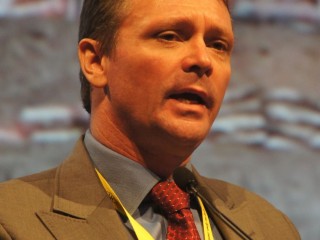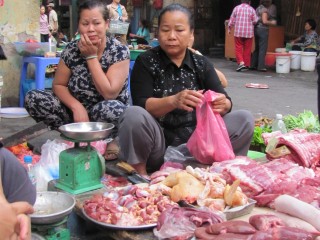 National elections in 2014 will have a strong bearing on Indonesia’s current self-sufficiency drive in key foodstuffs including beef, and the likely shape and volume of beef trade going forward.
National elections in 2014 will have a strong bearing on Indonesia’s current self-sufficiency drive in key foodstuffs including beef, and the likely shape and volume of beef trade going forward.
Despite this political process, beef demand and consumption across the country has real potential to grow further, with an estimated 100,000 tonnes increase in demand over the next three years through population growth and greater spending power alone.
These were some of the key messages delivered at last week’s Australian Meat Industry Council conference by trade representative, Dr John Ackerman.
Dr John Ackerman was appointed as Meat & Livestock Australia’s first Indonesia country manager in May. He has spent the previous five years in Jakarta as Australia’s agricultural counsellor to Indonesia.
Indonesia has long been earmarked as a strong beef trade prospect for Australia, with 230 million people on our doorstep and a growing level of affluence and a middle class with an appetite for beef:
- It is the largest Muslim country in the world, with 86pc of the population being practising Muslims, meaning there is little competition from pork as an alternate protein.
- Since 2003, about seven million Indonesians have made the transition into middle-class income-earning status, however there is still about 100 million people who earn less than $2 a day.
- The Indonesian economy remains strong, with low debt levels and current GDP growth at about 6.5pc
- Current annual beef consumption is between 1.7kg and 2.4kg, depending on which figures are used, and the Indonesian Government’s objective is to raise that to 5kg.
With current total beef consumption estimated at about 500,000 tonnes/year, the imported boxed beef market lifted 450 percent between 2005 and 2010, Dr Ackerman told the conference.
“That is a huge number, and illustrates that they are very reliant on imports – a position that the government does not want to be in, for food security reasons,” he said.
Australia accounted for 55 percent of the market, with New Zealand, the US and Canada also making a play.
The political process leading up to Presidential elections in 2014 was likely to have a strong bearing on future policy decisions and how the trade evolves.
Dr Ackerman said the Indonesian President, Dr Yudhoyono, was in his second five-year term, meaning he could not run for the Presidency again.
That made the run-up to the 2014 elections particularly important, he said.
Each of the six parties represented in the ruling government was making a play for the Presidency, and each ruled a different government ministry. This was one reason why the objective seen in an agriculture ministry policy statement might sometimes appear a little out of sync with a trade or economic affairs ministry position.
 Dr Ackerman said Indonesia’s well-publicised beef self-sufficiency program did not imply that the country was looking to become 100pc self-sufficient in beef production.
Dr Ackerman said Indonesia’s well-publicised beef self-sufficiency program did not imply that the country was looking to become 100pc self-sufficient in beef production.
“They are talking about self-sufficiency in terms of 90pc of their domestic production meeting the demand by 2014, leaving just 10pc of future demand to be filled by imports. The two major justifications are food security, and the fact that Indonesia has an enormous agribusiness sector. It is very important for the Ministry of Agriculture to be seen to be assisting their businesses, and providing security for the people,” he said.
The Indonesian Government wrote a blueprint early last year which guides the country’s policy decisions in this area. Some of its key points include:
- Undertaking measures that open opportunities with other countries
- Biosecurity aspects, including ensuring that food is safe, healthy, whole and Halal. This is one reason why Australia is in a strong position to provide more meat products into Indonesia
- The country wants to support the development of its tourism industry, meaning higher quality meat may play a growing role
- The Government has suggested changes to a range of laws which it suggests are not within the spirit of the blueprint. One of those is a ban on exports to Indonesia from countries with Foot and Mouth Disease. One of the Government departments is pushing to change that law to allow beef from zone-based free areas to enter Indonesia. If successful that could see product from some parts of South America enter Indonesia for the first time.
Projections of where the Government blueprint wanted to see self-sufficiency in beef head between now and 2014 showed a steadily decline in imported product, Dr Ackerman said.
“In 2010 and 2011, they have gone well beyond that already,” he said.
He did not offer a comment on how achievable the aims were longer-term, however he pointed out that the Indonesian government for some time had stated that to achieve its self-sufficiency target by 2014, the country would need at least 14.5 million cattle.
“A month ago it was announced that they had achieved that target, which if true would essentially mean the country is now self-sufficient, and no longer need imports from Australia.”
But the vice-minister for Agriculture had since produced figures which had never been touted before, saying with the growing population and current demand for beef, Indonesia would in fact need 20 to 27 million head of cattle to support its own requirements. That’s roughly the size of the beef herd in Australia.
“That’s a particularly important statement, because for the first time a senior official in the Indonesian Government has outlined the division between the politically-driven statements, and the reality of what is going on,” Dr Ackerman said.
“Between 2004 and 2006, imported beef accounted for about 75pc of total Indonesian demand, which raised a red flag to the Indonesian Government, and creates some of the development policies that have since been seen. In 2007, for example, the Government introduced a policy regulation to reduce the types of imported offal from eight items down to two.”
Dr Ackerman warned that there was likely to be further political posturing from the Indonesians as the 2014 elections drew closer.
“We have seen it already, and I think we will see more. That is likely to create further challenges for Australia in terms of trade. It is certainly a complex bureaucracy, with central and district governments all writing legislation that sometimes conflicts,” he said.
Beef self-sufficiency by 2014 would continue to create challenges, with the political posturing and the political statements likely to emerge.
Quotas for import permits, or allocations for permits as the Indonesian government liked to call them, was another area of difficult challenge going forward – often with a lack of clear and transparent signals or dispute settlement process.
“However I am hopeful that the Australian and Indonesian Governments’ announcement of a comprehensive economic partnership agreement negotiation late last year that some progress will be made,” Dr Ackerman said.
“With population growth alone, we can expect even without the Government’s desire to lift consumption to 5kg a year, to see beef demand grow by at least another 28,000 tonnes each year. Further growth in income in the economy by 2014 could see another 70,000t on top of that – giving potential demand increase of 100,000t by 2015,” he said.
“Australia remains well placed to play a role in Indonesia, regardless of the political posturing process, because we can be a stable and reliable supplier of a commodity of concern to them to meet their food security issues.”
